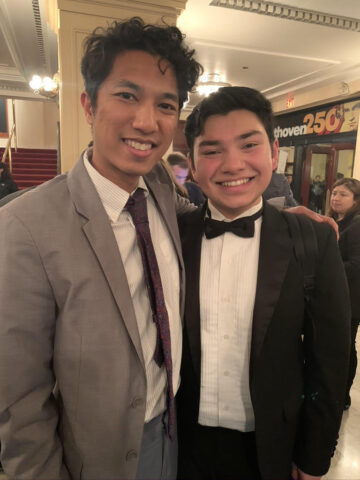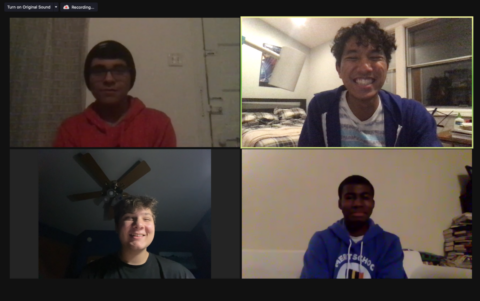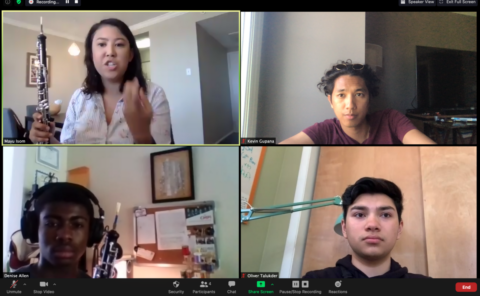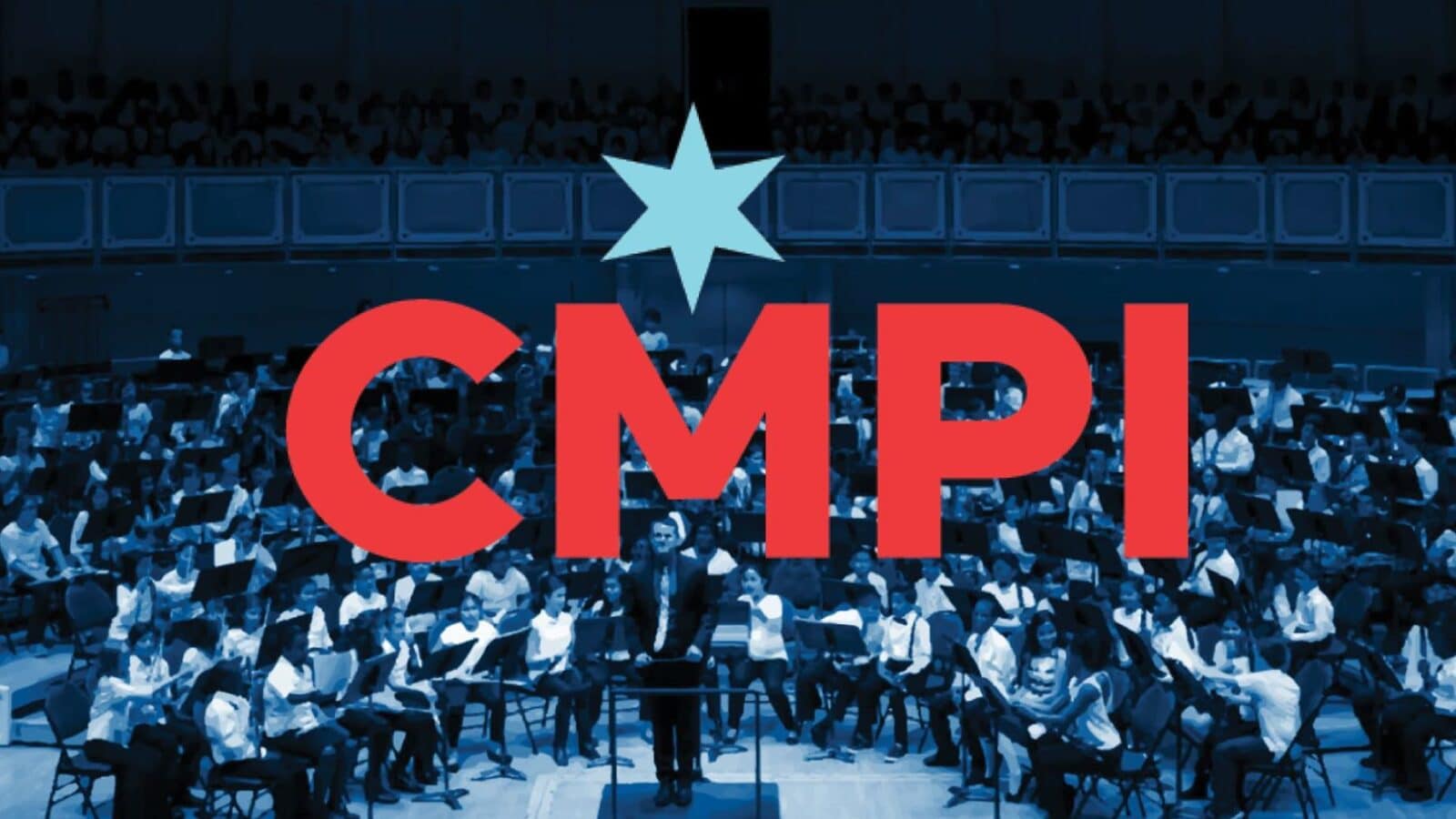Kevin Gupana distinctly remembers when he first got serious about the oboe. It was his freshman year of high school, at the annual holiday assembly. “The full orchestra was onstage, playing, and I realized that’s what I wanted to do with my life.”

CMPI Mentor Kevin Gupana with CMPI alumnus Oliver Talukder. This former mentee from last year is now studying at the Curtis Institute of Music.
Gupana, now a mentor with the Chicago Musical Pathways Initiative [CMPI], had always been interested in music as a child. His parents, who are not musically inclined, would watch as their young self-starter volunteered himself to learn the oboe and join the school band. However, it wasn’t until that fateful school assembly that Gupana focused his attention on oboe performance.
“I just kind of found my way through the music world,” said Gupana, during a recent interview via Zoom. “In that way, this has always been a journey of self-discovery, I guess.” It’s a musical path that has led him to performance degrees from Roosevelt University’s CCPA and Houston’s Moores School of Music, as well as to his current role with the Chicago Youth Symphony Orchestra [CYSO] as its development coordinator. The journey recently came full circle when Gupana became a CMPI mentor.
“When I read the [October 2018] press release announcing the start of CMPI,” said Gupana, “I knew I had to be involved.” He soon thereafter found his way to the press conference, being held at DePaul University, and waited to steal a moment to speak to then newly-announced-project-director Adrienne Thompson. He told her, “My name is Kevin. I’m an oboist. I’m from Chicago. I’m here. I want to get involved in some way.” Thompson had a place for him as a CMPI mentor, a cohort of likeminded music professionals who offer guidance on navigating the intricacies, nuances, and unwritten rules of the classical music world.
“When I was in CYSO, in high school, and beginning to excel at my instrument, I really wanted someone to help guide me through the music world.” Gupana, who is of Filipino descent, said that his parents were somewhat “hands-off” with his musical development because “they didn’t know anything about it,” adding that Filipino culture often values the medical field and pragmatic trades over traditionally Euro-centric versions of art.

A recent Zoom meeting with mentees, hosted by Gupana.
The mission of CMPI resonates with Gupana, who thinks deeply about diversity, equity, and inclusion in classical music. “I’ve had my own personal experiences where I felt that I was somehow left out of the loop, or I was looked at differently because my parents didn’t know what to do or how to navigate the classical music ‘scene.’” He incorporates these experiences into his mentorship duties.
“Last year, I decided to make my process a family experience, while trying to build a community amongst the fellows.” That means talking with the families about the profession while promoting a supportive structure among the CMPI fellows. “For example, when I was growing up, I did not know that my parents needed as much education about the world of classical music as I did. That’s why what CMPI is doing, and what I’m trying to do as a mentor, is so important. We try to keep the families informed so they are not intimidated by the process.”
Much of Gupana’s mentorship style comes from the strong teachers he has had along his journey, especially Deb Stevenson (Metropolis Quartet), Lora Schaffer (Chicago Symphony Orchestra), and Robert Atherholt (Camerata Pacifica). “Without their mentorship and guidance, I wouldn’t be in a position to give back now.” One pedagogical method Gupana has recycled to connect with CMPI fellows is perhaps the oldest trick in the oboist’s book: reed-making.

A Zoom masterclass, hosted by Gupana over the summer, with Mayu Isom, English Horn of the Houston Grand Opera
The oboe and bassoon—which are played by moving air through an intricately designed double-reed—”have the steepest learning curve, in general, because of all the reeds and ligatures,” explained Gupana. Learning how to make your reeds, from scratch, is often a rite of passage for these instrumentalists. Last year, Gupana was making reeds with one of his eighth-grade mentees, with no prior experience making reeds. The student was very “stoic and focused” the whole time, and Gupana began to wonder if the student was overwhelmed, but at “the end of the session the student said that it was an amazing experience!” Gupana adds that “when students see and learn about the different styles and techniques of reed-making, it becomes an eye-opening experience for all of them.” Equally eye-opening is the ease with which Gupana discusses his other mentorship duties.
“A big part of my job is explaining to the families that their children have talent. If we can foster this talent,” stressed Gupana, “so that the students continue to be passionate about music and continue to get better, then that means everything. If they can get the resources they need, it makes the process easier and fairer.”
Gupana also believes that the arts are a means to advocate for change. “People, now more than ever, need music and the arts. People need to see themselves reflected in that art. So, if these students can get a seat at some of the great tables of classical music, they should take the opportunity, see where it goes, and use their voice to share beauty. It’s hard, but it’s so worth it in the end.”
You can follow Kevin Gupana on Instagram: @kguppy1014
Any fun plans for the holidays?
“I’ve arranged for as many oboe friends as I can fit onto one zoom screen to come together to play a section of Handel’s Messiah, “For unto us a child is born,” which is my favorite part of the holiday season. I’m also playing along with some Nutcracker recordings. I’m making-up my own holiday gigs during this pandemic!”
By Benjamin C. Wise
TOP: Kevin Gupana. Photo by Mike Grittani, 2014.
